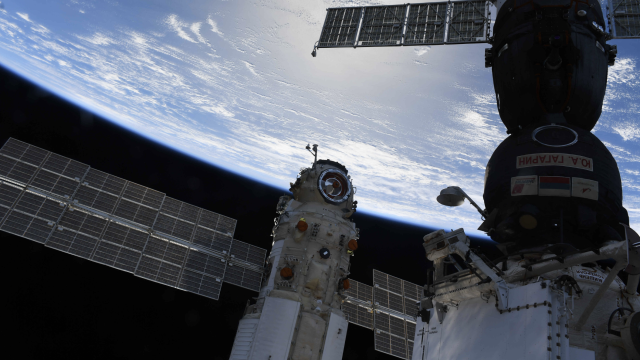Early reports suggest the International Space Station incurred no damage as a result of an incident last week involving the newly arrived Nauka module. That may be the case, but Russian officials are launching an investigation to assess the true impact of the frightening mishap.
Sergei Krikalev, the director of crewed space programs at Roscosmos, made the announcement on Wednesday during an interview with Rossiya-24 TV Channel. There’s probably no damage to the ISS, he said, but the unexpected rotation of the orbital outpost should now be “taken into account” when evaluating its service life, said Krikalev, in a translation provided by Russia’s state-run TASS news agency.
To which he added: “Nothing has broken off from the station, I can assure you. Specialists will now assess how much we have loaded the station and what the consequences are.” No details were given as to who will conduct the investigation or when it might get started.
By “loaded,” Krikalev is referring to the strain imposed onto the space station when it unexpectedly performed one-and-a-half backflips on Thursday, July 29. The freshly arrived Nauka module inadvertently fired its thrusters some three hours after docking, causing the space station to flip end over end. In response, flight controllers used thrusters on the Zvezda Service Module and a Progress cargo ship to counter Nauka’s thrust. Attitude control was regained when the space station was fully upside down, requiring another 180 degree turn to return it to its proper orientation.
Nauka’s thrusters caused the ISS to spin at a rate of 0.5 degrees per second, which NASA says is “well within the design limits of station systems.” All preliminary analyses suggest that the “station remains in good shape,” as a NASA spokesperson explained to me yesterday, adding that “the astronauts were not in immediate danger.” Roscosmos has blamed a software glitch for the incident.
But as Krikalev admitted, this was far from an ordinary situation, and an investigation is now warranted. The ISS is “quite a delicate facility,” he said during the interview, as both the “Russian and American segments were made with the utmost lightness.” The added load, he said, would’ve exerted strain “on the solar panel drive and the framework, on which all these structures were installed.”
That the mishap has resulted in some as-yet-unnoticed side effects is a distinct possibility. The station’s solar panels must be perfectly aligned to ensure optimal performance. Same deal for the antennas, which, if not oriented properly, could affect communications with ground stations on Earth. Other problems could exist as well, but to Krikalev’s point, the ensuing investigation should suss this out.
Overly cheerful statements from space agencies can’t hide the fact this was a truly unprecedented and frightening event. The newly announced investigation is both wise and necessary, regardless of what the findings might reveal.
More: Launch of Boeing’s Starliner delayed indefinitely due to vexing technical glitch.
